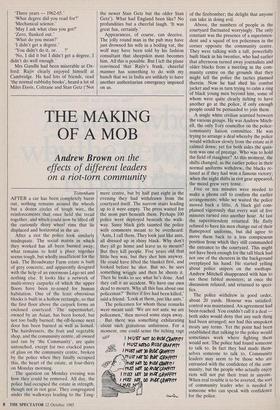THE MAKING OF A MOB
Andrew Brown on the
effects of different leaders on a riot-torn community
Tottenham AFTER a car has been completely burnt out, nothing remains around the wheels but a dozen circles of tough wire, the reinforcements that once held the tread together, and which could now be lifted off the curiously shiny wheel rims that lie displaced and horizontal in the air.
After a riot the police look similarly inadequate. The social matrix in which they worked has all been burned away; what remains to hold a place together seems tough, but wholly insufficient for the task. The Broadwater Farm estate is built of grey concrete, and apparently designed with the help of an enormous Lego set and nothing else. It looks like a network of multi-storey carparks of which the upper floors have been re-zoned for human habitation. One of the least obnoxious blocks is built in a hollow rectangle, so that the first floor above the carpark forms an enclosed courtyard. The supermarket, owned by an Asian, has been looted, but not too badly burned; the off-licence next door has been burned as well as looted. The hairdressers, the fruit and vegetable shop, and the community centre, all owned and run by 'the Community', are quite untouched, except for two cracked panes of glass on the community centre, broken by the police when they finally occupied this, the heart of the estate, at four-thirty on Monday morning.
The question on Monday evening was how they could be removed. All day, the police had occupied the estate in stfength, though not in riot gear. They congregated under the walkways leading to the Tang- mere centre, but by half past eight in the evening they had withdrawn from the courtyard itself. The narrow stairs leading up to it were empty. The press waited for the most part beneath them. Perhaps 100 police were deployed beneath the walk- way. Sassy black girls taunted the police with comments meant to be overheard: `Ants, I call them. They look just like ants, all dressed up in shiny black. Why don't they all go home and leave us to mourn? But they kill people. Five years old that little boy was, but they shot him anyway. He could have lifted the blanket first, and looked before he shot. But no, he sees something wriggle and then he shoots it. Then he looks to see what he's done. And they call it an accident. We have our own dead to mourn. Why all this fuss about one policeman?' 'Better if five had been killed,' said a friend. 'Look at them, just like ants.'
The policemen for whom these remarks were meant said: 'We are not ants: we are policemen,' then moved some steps away.
But there was something exhilarating about such gratuitous unfairness. For a moment, one could sense the itching rage of the firebomber; the delight that anyone can take in doing evil.
Above, the numbers of people in the courtyard fluctuated worryingly. The only constant was the presence of a superinten- dent and a squad of ten policemen in the corner opposite the community centre.
They were talking with a tall, powerfully built black in his twenties, who had earlier that afternoon turned away journalists and older blacks from a meeting in the com- munity centre on the grounds that they might tell the police the tactics planned therein. Now he had shed his combat jacket and was in turn trying to calm a ring of black young men beyond him, some of whom were quite clearly itching to have another go at the police, if only enough people could be persuaded to join them.
A single white civilian scurried between the various groups. He was Andrew Mitch- ell, the only Tory councillor on the police- community liaison committee. He was trying to arrange a deal whereby the police would withdraw slowly from the estate as it calmed down; yet for both sides the ques- tion was one of prestige. Who was to hold the field of slaughter? At this moment, the shifts changed; as the earlier police in their normal uniforms withdrew, the blacks re- laxed as if they had won a famous victory; when the night shifts in riot gear appeared, the mood grew very tense.
Five or ten minutes were needed to make a phone call to confirm the earlier arrangements; while we waited the police moved back a little. A black girl com- plained vigorously that every wait of five minutes turned into another hour. At last the superintendent returned. He flatly refused to have his men change out of their flameproof uniforms, but did agree to move them back to a less conspicuous position from which they still commanded the entrance to the courtyard. This might not have been enough for the tall black had not one of the shouters in the background overplayed his hand. He started yelling about police snipers on the rooftops. Andrew Mitchell disappeared with him to see these fabled monsters; at once the discussion relaxed, and returned to speci- fics.
The police withdrew in good order, about 20 yards. Honour was satisfied; control was maintained. An agreement had been reached. You couldn't call it a deal— both sides would deny that any such thing had been arranged; nor had this unspoken treaty any terms. Yet the point had been established that talking to the police would sometimes work where fighting them would not. The police had found someone to talk to. In fact they had made them-
selves someone to talk to. Community leaders may seem to be those who are entrusted with the confidence of the com- munity, but the people who actually enjoy riots will not put their trust in anyone. When real trouble is to be averted, the sort of community leader who is needed is someone who can speak with confidence for the police.






















































 Previous page
Previous page